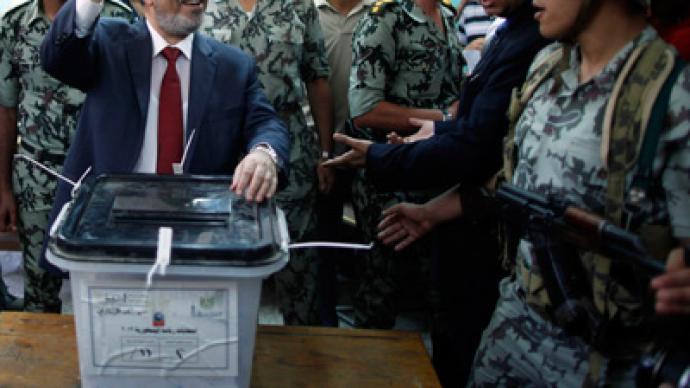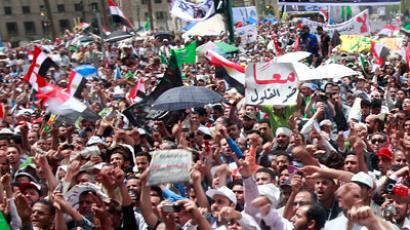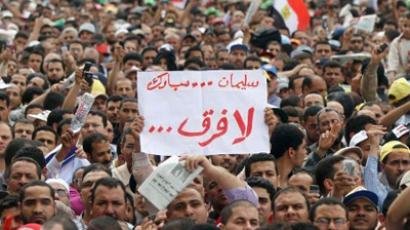Voters’ dilemma: Egyptians choosing president

The first day of voting in Egypt's presidential election run-off is over. Egyptians are faced with a tough decision with the ballot coming amid mass indignation after both houses of Egypt's parliament were suspended by the Constitutional Court.
The vote, which is taking place on Saturday and Sunday, represents the first free presidential election since the 2011 revolution. The two-man run-off sees Mohamed Morsi, the chairman of Muslim Brotherhood’s Freedom and Justice Party, and Ahmed Shafiq, a former prime minister of Egypt under ousted ex-leader Hosni Mubarak, going head to head.Tensions are running high as voters cast their ballots. Thousands of people have chosen to boycott the election saying neither candidate represents the values of last year's revolution.In April, the Islamist-led parliament had sought to bar Ahmed Shafiq and any other high-ranking official from the Mubarak government from exercising "political rights for ten years."Two days ago, on June 14, the Supreme Constitutional Court of Egypt decreed that Egypt’s lower house of parliament be dissolved, following a court verdict which determined that a hastily considered election law was illegal.The court's decision overturned a law passed by the Islamist-led parliament. Now that the law has been thrown out, former PM Shafiq has the right to face off against Mohamed Morsi of the Muslim Brotherhood in two days’ time.The decision to dissolve the Islamist-dominated parliament is already being seen as a non-violent coup by the ruling military junta.So far, no major violations at the polling stations have been reported. Egypt’s High Elections Commission, however, has warned against acquiring pens from vendors near the polling stations. The pens are said to contain ink which will disappear shortly after the ballot is cast, leaving the bulletin invalid.The General Secretary for the Commission has instructed the police and army to detain those selling or otherwise distributing the pens. He added that the Commission has provided all polling stations with enough pens. Voters therefore are discouraged from using their own writing instruments.The official results are set to be announced on June 21. But with neither a parliament, nor a new constitution in place to define the president's powers, some experts doubt the voting will be able to settle the matter.
‘Multiple crises’
An expert on the Middle East and Islamic studies, Dr. Omar Ashour, says Egypt faces multiple crises regardless of the outcome of the vote.“After the parliament was dissolved, many saw this as a danger of the old regime of Hosni Mubarak coming back in the form of his last prime minister,” he told RT. “Right now, we have a president without a mandate coming without a legislative branch, and the legislative branch refuses to disband because the argument is that the authorities of the state – the judicial and the legislative – cannot dismantle each other.”As a result, Egypt is likely to be heading towards a clash between the elected parliament on one side and possibly the Supreme Council of the Armed Forces on the other. The Constitutional Court is perhaps going to contribute to this clash as well, says Ashour.“It’s noteworthy that most of [the judges of the Constitutional Court] were appointed by Mubarak, and many here see them as a continuation of the so-called ‘deep state’ here in Egypt – the group of generals and judges who were affiliated with the status quo of Mubarak and more or less want to keep that status quo viable,” he explained.The political situation in Egypt is very vague, and “we are probably looking at multiple crises” with the parliament, with the Constitution, and one concerning the upcoming president, Dr. Ashour concludes.
‘Military Council only real political power in Egypt’
Political tensions over the presidential poll may be running high in the country, but in reality Egyptians are more concerned with their own survival, remarks independent journalist Thomas Mountain. This effectively leaves the scene to other players.“For me, this election is not about what the Egyptians want, but what the USA wants. Egypt is run by a military council which was put into power basically with US approval last year as Hosni Mubarak was toppled,” Mountain told RT.The US has invested around US$100 billion to keep the Egyptian military funded, continued the journalist. “Real political power comes from the barrel of a gun,” so whatever the results of the elections may be, the military will not lose the gun. This would return the US back on top of processes in Egypt and ultimately reaffirm their control of the Suez Canal.“The US cannot afford to lose control of the Suez Canal,” Mountain points out. “Some two thirds of the world’s commerce passes through the canal every day. The Suez Canal and the Horn of Africa are the two most critical strategic areas in the world today.”














